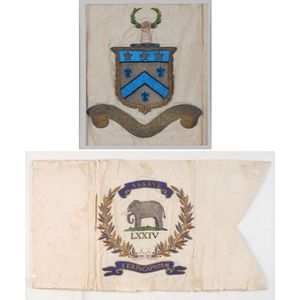Highland Regiment Pennant: Seringapatam & Assaye Victories, ca 1810
74th Highland Regiment of Foot Pennant with battle honours for Seringapatam (1799) and Assaye (1803). The Elephant emblem awarded to the regiment for Assaye surrounded by laurels with unidentified armorials on the reverse, all very finely embroidered in highlighted colours on silk, some signs of wear, good over all condition considering age, ca 1810. 31 x 57 cm, mounted & framed. The victories by the British East India Company in these two important campaigns over the Kingdom of Mysore and the Maratha Empire consolidated British power in India. Provenance: Estate of John Lawford.
You must be a subscriber, and be logged in to view price and dealer details.
Subscribe Now to view actual auction price for this item
When you subscribe, you have the option of setting the currency in which to display prices to $Au, $US, $NZ or Stg.
This item has been sold, and the description, image and price are for reference purposes only.
- East India Company - The British East India Company was a British trading company that was active from 1600 to 1858. It was one of the leading commercial enterprises of its time and played a key role in the development of British trade and commerce with India, China, and Southeast Asia.
The British East India Company was granted a monopoly on trade with the East Indies by the English government, and it quickly established a network of trading posts and settlements throughout India and Southeast Asia. The company was involved in numerous wars and conflicts in India and Southeast Asia, and it gradually gained political influence over large parts of the region.In addition to its commercial activities, the British East India Company was also involved in the spread of British culture and influence in the regions it traded with. The company played a significant role in the introduction of British goods, ideas, and institutions in India and Southeast Asia, and it was instrumental in the establishment of the British Empire in India.The British East India Company was dissolved in 1858, following the Indian Rebellion of 1857.
The Dutch East India Company, also known as the Vereenigde Oost-Indische Compagnie (VOC), was a Dutch trading company that was active from 1602 to 1798. It was one of the first multinational corporations in the world and one of the largest commercial enterprises in history.
The Dutch East India Company was established with the goal of establishing a trade monopoly in the spice trade with the East Indies. The company was granted a 21-year monopoly on the Dutch spice trade, and it quickly became one of the most successful and powerful trading companies in the world.
Over the course of the 17th and 18th centuries, the Dutch East India Company expanded its reach and influence throughout Southeast Asia, the Indian subcontinent, and the Far East. The company established a network of trading posts and colonies, and it played a major role in the commercial and political development of many regions in Asia.
Despite its commercial success, the Dutch East India Company was also notorious for its ruthless treatment of local populations and its exploitation of resources. The company was involved in numerous conflicts and wars throughout its history, and it was accused of using slave labor and engaging in acts of piracy.
The Dutch East India Company was dissolved in 1798.
